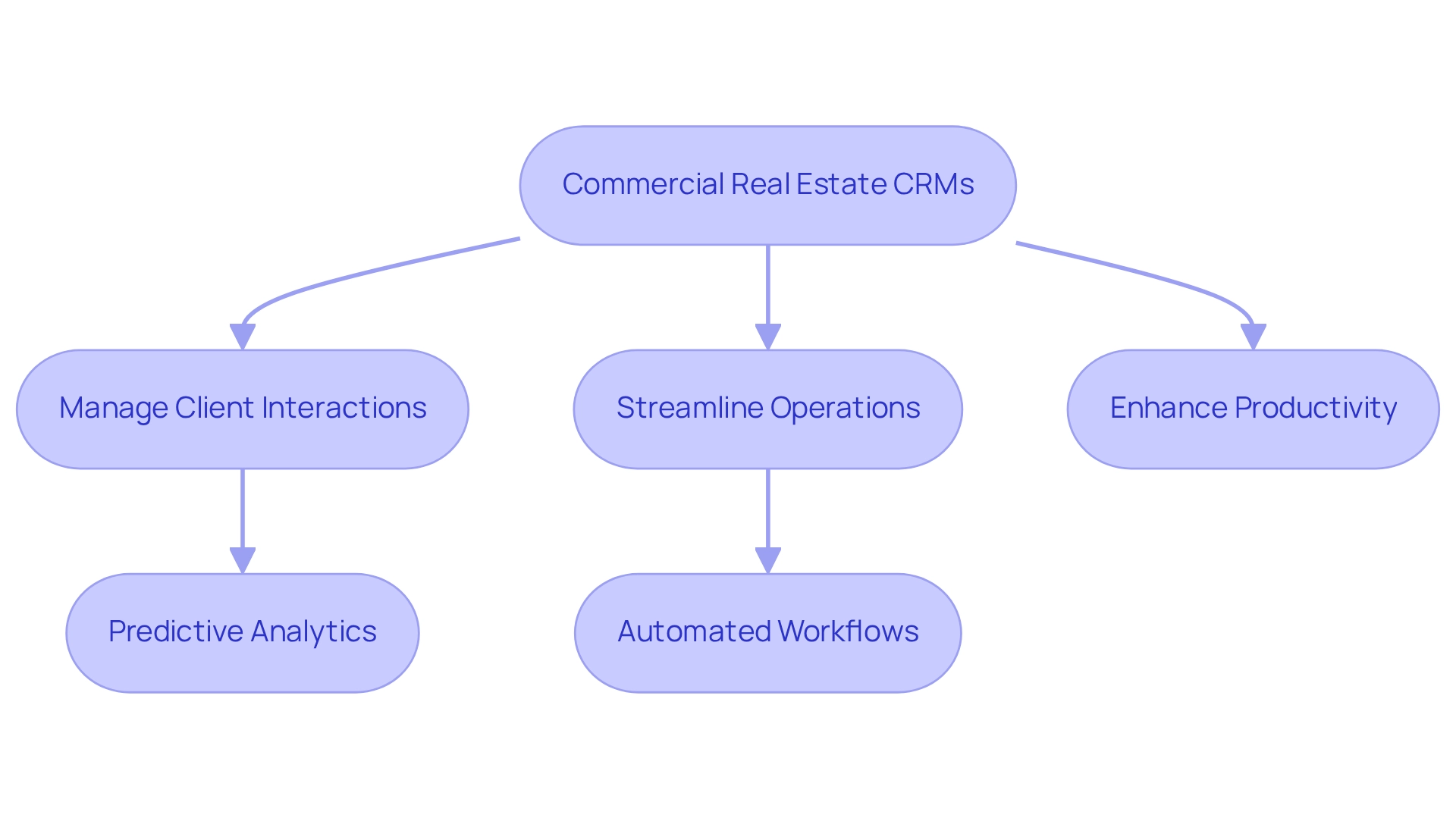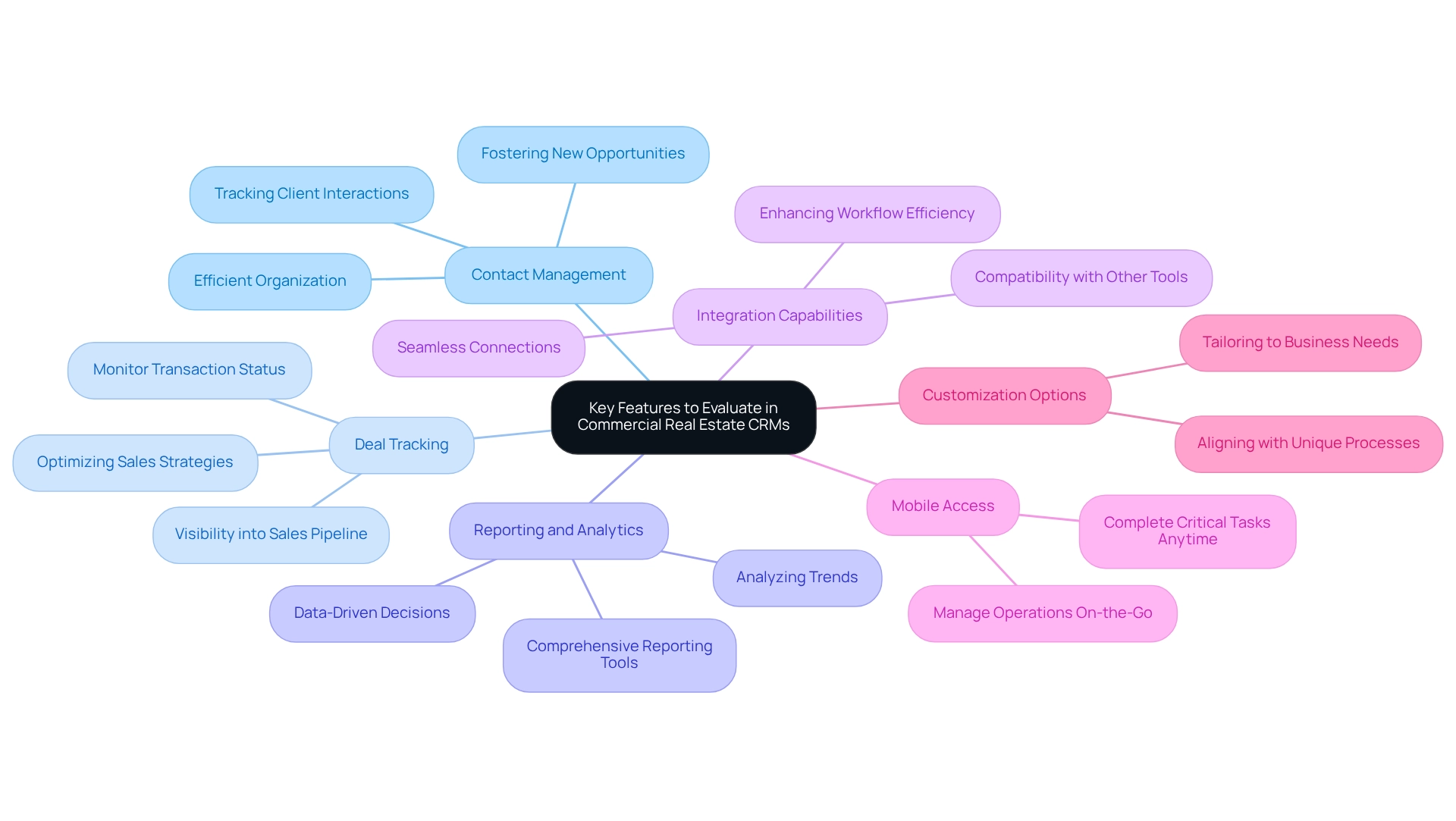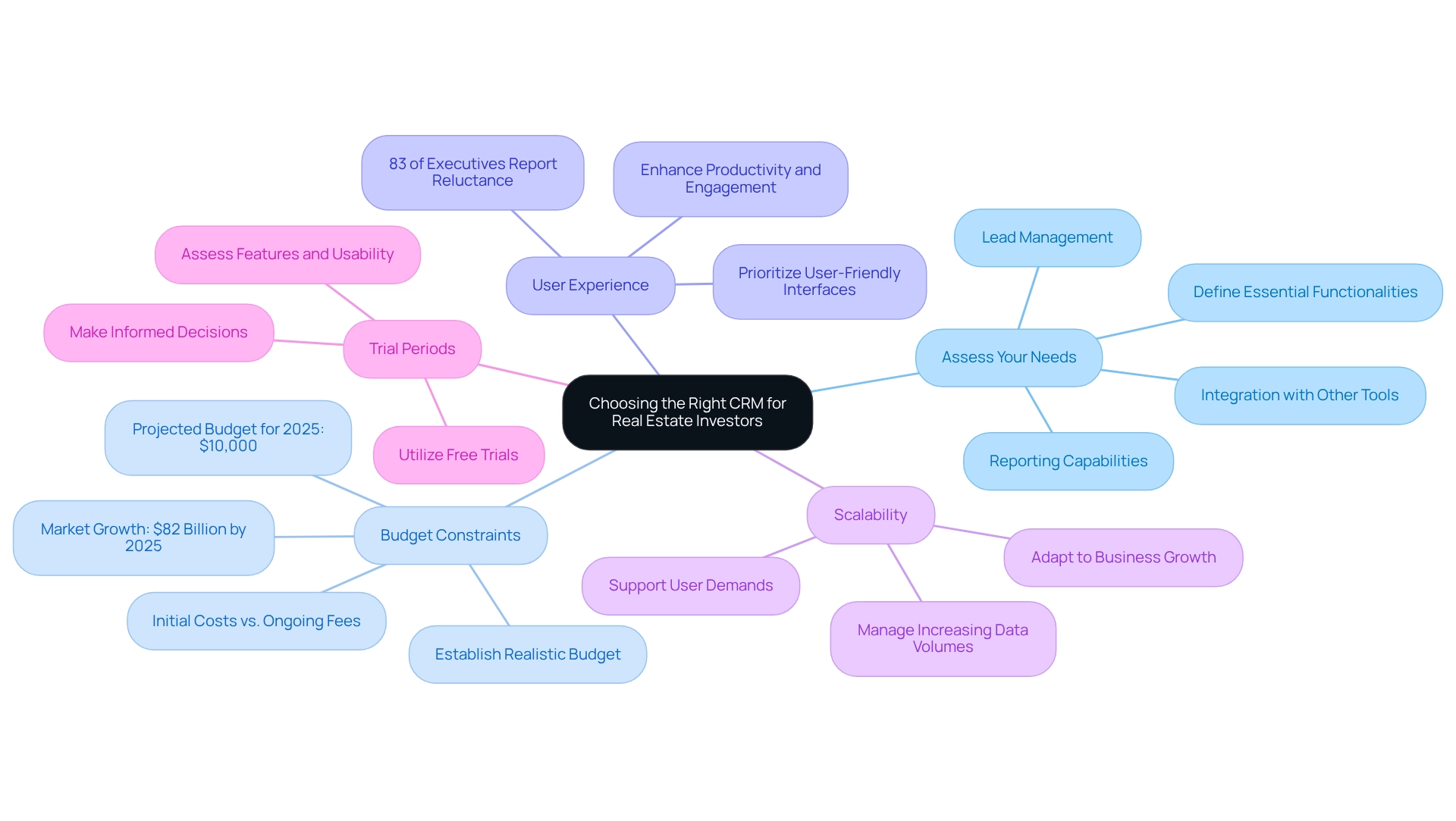Overview
The most essential commercial real estate CRM features for investors encompass:
- Contact management
- Deal tracking
- Reporting and analytics
- Integration capabilities
- Mobile access
- Customization options
These features are not merely functional; they significantly enhance operational efficiency and decision-making. By effectively managing client interactions, investors can optimize their investment strategies, gaining a competitive edge in the market. Consider how these tools can transform your approach to real estate investment. Are you ready to leverage these capabilities to elevate your business?
Introduction
In the dynamic realm of commercial real estate, mastering client relationships is not just beneficial; it is essential for achieving success. As competition escalates, real estate professionals are increasingly adopting specialized Customer Relationship Management (CRM) systems to optimize operations and boost productivity. These robust tools centralize critical data and automate routine tasks, empowering investors to concentrate on strategic decision-making.
With the CRM market poised for significant growth, grasping the key features and advantages of these systems is more crucial than ever. This article explores the intricacies of commercial real estate CRMs, providing insights into their functionality, a comparative analysis of leading platforms, and guidance on selecting the ideal CRM to enhance investment success.
Understanding Commercial Real Estate CRMs
The top commercial real estate CRM systems are specialized software tools designed to assist property professionals in managing client interactions, streamlining operations, and enhancing productivity. These systems centralize data related to properties, clients, and transactions, enabling users to effectively track leads, manage deals, and maintain communication with stakeholders. By automating routine tasks and providing analytical insights, CRMs empower individuals to make informed decisions and optimize their business processes. In the competitive landscape of commercial property, leveraging the top commercial real estate CRM can significantly enhance a buyer's ability to manage connections and successfully finalize transactions.
The global commercial property CRM system revenue is projected to increase notably, reflecting the escalating demand for improved sales and marketing effectiveness. A recent report highlights that this growth is fueled by the rising need for advanced CRM features, including predictive analytics and automated workflows. As we approach 2025, the trend toward adopting the top commercial real estate CRM continues to gain momentum, with many investors recognizing the substantial advantages that the top commercial real estate CRM systems offer. For example, the total industrial inventory in Chicago exceeds 1.2 billion square feet, while New Jersey has witnessed the fastest industrial rent growth at 9.8% year-over-year, underscoring the necessity for effective client relationship management in a dynamic market.
Practical examples illustrate how CRMs bolster productivity in commercial property. Firms that utilize the top commercial real estate CRM systems report improved client engagement and expedited deal closures—crucial elements in a fast-paced environment. Moreover, industry leaders stress the significance of the top commercial real estate CRM systems in real estate management. Erik Perison, US TPS Business Development Manager at Thermon, asserts, "The growing need for improved sales and marketing efficiency and enhanced client relationship management drives businesses to adopt advanced CRM features such as predictive analytics, AI-driven lead scoring, and automated workflows."
By harnessing CRM technology, stakeholders can enhance their operational efficiency and cultivate stronger client relationships, ultimately leading to more successful investment outcomes. Additionally, resources like Zero Flux provide essential insights into market trends, further aiding individuals in making informed choices.

Key Features to Evaluate in Commercial Real Estate CRMs
When evaluating the top commercial real estate CRM, investors should prioritize several key features that significantly enhance operational efficiency and decision-making.
-
Contact Management is paramount. This feature allows for the efficient organization and tracking of client interactions, ensuring that no lead is overlooked. Effective contact management is crucial for maintaining relationships and fostering new opportunities.
-
Next, consider Deal Tracking. A robust deal tracking system enables investors to monitor the status of transactions from initial contact to closing. This visibility into the sales pipeline is essential for managing expectations and optimizing sales strategies.
-
Reporting and Analytics capabilities are vital for making data-driven decisions. Investors benefit from the top commercial real estate CRM, which provides comprehensive reporting tools that allow them to analyze trends and adjust strategies accordingly. As the commercial property market evolves, particularly with the growth of sectors such as data centers and eco-friendly structures, possessing a CRM that offers comprehensive insights can be transformative.
-
Furthermore, the capabilities of the top commercial real estate CRM for integration are critical. A CRM should seamlessly connect with other tools and platforms used in the business, such as marketing automation and financial software. This integration enhances workflow efficiency and ensures that all systems work harmoniously. Notably, Salesforce can be costly, particularly for smaller companies needing advanced features; thus, cost considerations are crucial in CRM selection.
-
In today's dynamic property market, Mobile Access is essential. A mobile-friendly interface allows users to manage operations on-the-go, ensuring that critical tasks can be completed anytime, anywhere.
-
Lastly, the top commercial real estate CRM includes customization options that significantly enhance usability and effectiveness. The ability to tailor the CRM to specific business needs ensures that it aligns with the unique processes of the client's operations.
Investors should also recognize the growing importance of reporting and analytics in their CRM selection. Testimonials from property stakeholders emphasize the significance of features such as contact management and deal tracking in effective investment strategies. For instance, Foundry CRM has emerged as a cost-effective solution for smaller firms, offering a one-time setup fee that appeals to price-sensitive brokerages while effectively integrating contacts, properties, and deals, albeit with some limitations in integrations and customization. As Kateryna Zhuk notes, "The selection requires a disciplined approach, dedication of time to review the various options and attention to detail on what separates each solution.

Comparative Analysis of Leading Commercial Real Estate CRMs
| CRM Name | Key Features | Pros | Cons | Pricing Information | |----------------|---------------------------------------|----------------------------------------|----------------------------------------|------------------------------------------| | Salesforce | Customizable dashboards, robust analytics, extensive integrations | Highly customizable, strong support community | Can be complex for new users, higher cost | Varies based on customization and usage | | HubSpot | Free tier available, user-friendly interface, marketing tools | Easy to use, great for small teams | Limited features in free version | Free tier; paid plans available | | AscendixRE | Built specifically for commercial real estate, property management tools | Tailored for CRE, strong reporting features | May lack some integrations compared to larger CRMs | Varies based on features | | RealNex | Basic and advanced subscription plans, lease tracking capabilities | Affordable options, tracks lease expirations | Limited advanced features compared to larger CRMs | Basic: $99/month; Advanced: $149/month | | Romans CRM | Comprehensive CRM features for real estate | Strong property management tools | Higher cost may deter small investors | Base package: $600/month; Setup fee: $200 |
This comparative analysis highlights the distinct advantages and limitations of each CRM, enabling investors to make informed decisions based on their specific operational requirements and budget considerations. Salesforce stands out for its extensive customization and support, while HubSpot offers user-friendliness and a free tier, making it ideal for smaller teams. AscendixRE, recognized as a top commercial real estate CRM for the commercial property sector, offers strong management tools but may have fewer integrations than its larger competitors. RealNex provides competitive pricing and essential tracking features, while Romans CRM caters to those needing comprehensive solutions despite its higher cost. As Kateryna Zhuk notes, selecting the right CRM requires a disciplined approach and attention to detail, ensuring that investors choose a system that aligns with their needs.

Choosing the Right CRM for Real Estate Investors
Choosing the top commercial real estate CRM for property investment requires a strategic approach that focuses on several critical factors:
-
Assess Your Needs: Clearly define the functionalities essential for your operations, such as lead management, reporting capabilities, and integration with other tools.
-
Budget Constraints: Establish a realistic budget for your CRM investment, considering both initial costs and ongoing subscription fees. In 2025, the typical budget for CRM systems among property professionals is projected to be around $10,000. This reflects an expanding market, expected to reach $82 billion with a yearly growth rate of 12%.
-
User Experience: Prioritize user-friendly interfaces, as ease of use significantly influences adoption rates among team members. Notably, about 83% of senior executives have reported reluctance among staff to incorporate CRM software into their daily routines, emphasizing the necessity for a seamless experience that can enhance productivity and engagement.
-
Scalability: Choose a CRM that can adapt to your business's growth, ensuring it can manage increasing data volumes and user demands as your operations expand.
-
Trial Periods: Take advantage of free trials to assess the features and usability of the top commercial real estate CRM, enabling you to make an informed decision before committing.
By carefully considering these factors, real estate investors can select a CRM that not only meets their immediate needs but also positions them for future growth. This strategy is supported by case studies indicating that integrating social and mobile capabilities into CRM systems has resulted in a productivity increase of 26.4% for sales representatives, underscoring the importance of choosing a system that aligns with modern operational demands.

Conclusion
In the competitive landscape of commercial real estate, harnessing the power of specialized Customer Relationship Management (CRM) systems is no longer just an option; it is a necessity for success. These sophisticated tools centralize critical data, streamline operations, and enhance productivity, enabling real estate professionals to focus on building strong client relationships and making strategic decisions. With the CRM market poised for significant growth, understanding the key features and benefits of these systems becomes essential for investors aiming to optimize their operations.
Evaluating the right CRM requires a careful assessment of features such as:
- Contact management
- Deal tracking
- Reporting and analytics
- Integration capabilities
By prioritizing these elements, investors can select a system that not only meets their current needs but also adapts to future demands. A comparative analysis of leading platforms reveals a diverse array of options, each with unique advantages and potential drawbacks. This informed approach empowers real estate professionals to choose a CRM that aligns with their operational requirements and budget constraints.
Ultimately, the right CRM can transform the way investors manage relationships and close deals, leading to improved outcomes in a dynamic market. By embracing the capabilities of these tools, real estate professionals can enhance their productivity, foster stronger client connections, and position themselves for long-term success. As the industry continues to evolve, staying ahead of the curve with a robust CRM will be crucial for navigating the complexities of commercial real estate investment.




